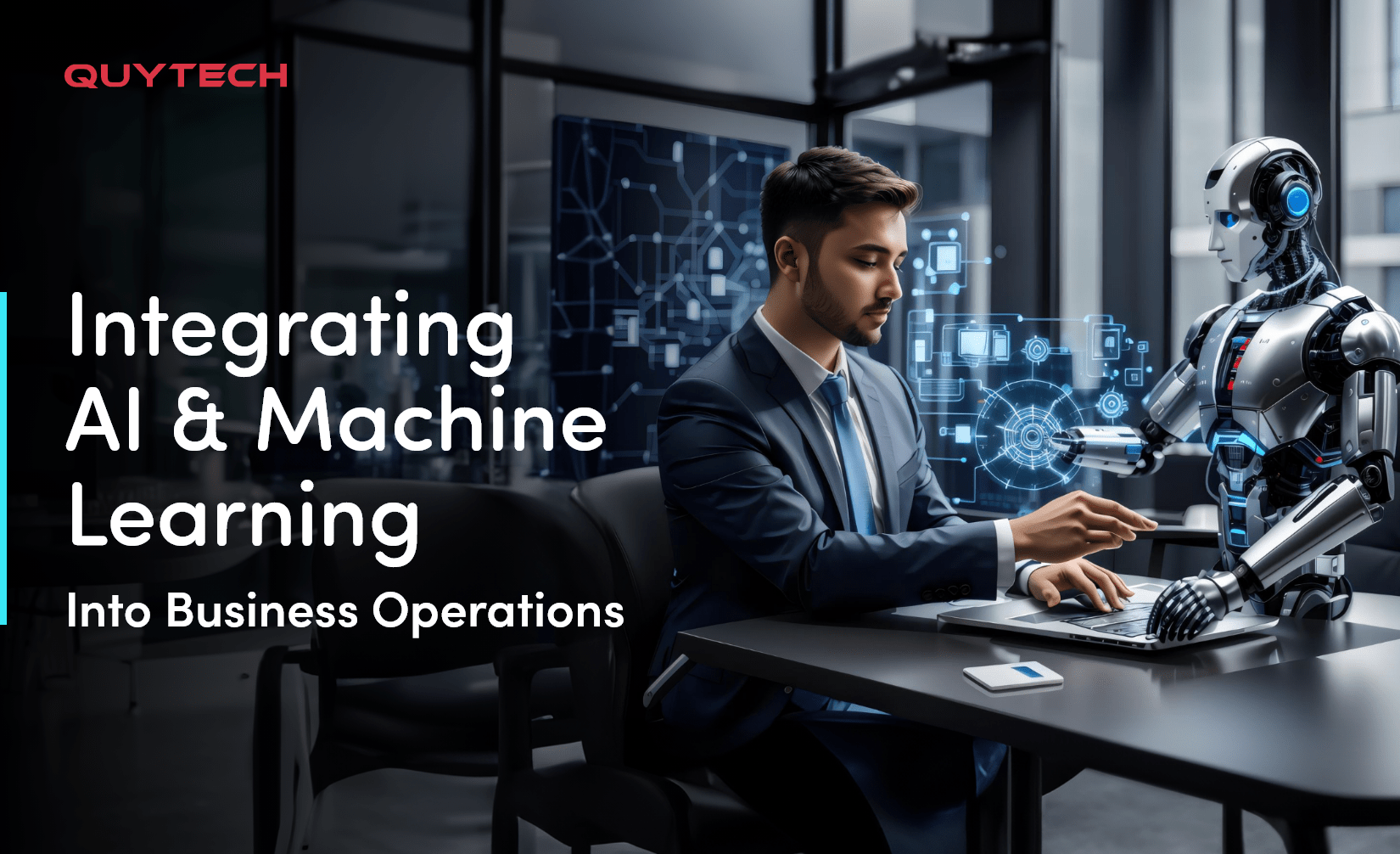“AI is like electricity. It’s everywhere, and it’s going to be in everything.” – Andrew Ng
In this blog, we are going to dive deep into the exciting domain of machine learning, artificial intelligence, and, deep learning. We will discuss how these technologies transform various sectors by improving decision-making and boosting efficiency.
From supply chain operations to personalized recommendations, we will look at their real-world use cases and benefits. So buckle up as we explore how AI and ML are reshaping the future of business operations!
Let’s start with the basics of Machine learning and artificial intelligence.
What is Machine Learning and AI? What Sets Them Apart?
Although as a term, artificial intelligence and Machine learning are used interchangeably, they are significantly different. AI is a vast field that focuses on creating systems that are advanced enough to do the tasks that normally require human intelligence, for example, understanding natural language, and patterns, making decisions, etc.
On the other hand, Machine learning (ML) is a sub-domain of AI that excels in teaching computers to learn from input data and enhance their performance subsequently without being exclusively programmed for each task.
The core distinction that exists between AI and Machine learning: AI comprises the concept of intelligent machines but Machine learning is mainly about algorithms and making predictions based on input data. By integrating AI and ML, businesses can automate and improve very complex tasks like decision-making and operation efficiency.
“McKinsey research shows that gen AI could enable automation of up to 70 percent of business activities, across all occupations, between now and 2030”.
Practical Use Cases of Integrating AI and Machine Learning in Business Operations
Predictive Analysis and Data-driven Decision Making
AI and machine learning help businesses process and analyze large sets of data to predict trends and outcomes. This predictive analysis made possible due to AI helps businesses make data-driven decisions.
The analysis helps them to reduce risks and capitalize on opportunities sooner than their competitors. For example, retail companies with the help of AI can predict customer buying behavior to optimize their inventory and increase sales eventually.
Automation and Efficiency
Integrating AI and machine learning into business operations will help in making repetitive tasks easier to do and, thereby, streamlining the whole process of business operations and making it more effective. AI and ML-powered systems are capable of answering customer inquiries, processing data, and performing routine tasks which were earlier done by employees but now can concentrate on the strategic activities only. This, in turn, boosts productivity and lowers operational costs a lot.
Helping Organizations Reinvent Talent Management Practices
The AI-driven software tools aid in revamping the way organizations handle talent management by providing the analysis of employee performance, forecasting future hiring needs, and improving human resource training programs. Machine learning algorithms can also detect skill gaps and suggest personalized training paths, hence, providing the business with a more engaged and skilled workforce.
Supply Chain Optimization
AI and ML streamline supply chains by predicting demand, optimizing inventory, and reducing waste. Advanced algorithms analyze vast amounts of data, enabling companies to forecast trends, manage logistics efficiently, and respond swiftly to market changes, ultimately enhancing overall operational efficiency.
Fraud Detection and Risk Management
AI and ML boost fraud detection by finding unusual patterns and anomalies in real time. These technologies check transactions, users’ behaviors, and data history to find and stop fraudulent activities, thus helping to ensure better risk management and the safety of financial assets.
Personalized Recommendations
AI and ML are used by businesses to give personalized product and service recommendations to customers. Through examination of customers’ data, preferences, and behavior, these technologies provide personalized suggestions, which in turn improve customer experience, increase engagement, and boost sales.
Predictive Maintenance
AI and ML predict the equipment failures before they happen by the analysis of the data from the sensors and the historical maintenance records. This way of managing maintenance helps in the reduction of downtime, the elongating of the machine life, and the reduction of maintenance costs, which in turn makes the operations more efficient.
Enhanced Security
AI and ML make security stronger by monitoring and analyzing network traffic and detecting threats and vulnerabilities thereby taking care of the security issue. These technologies can detect unusual activities, automate threat responses, and enhance security protocols, which provide powerful protection against cyber-attacks and data breaches.
Benefits of Integrating AI and Machine Learning in Business Operations

Enhanced Productivity
Including AI and ML can lead to significant improvement in the productivity of the workforce by automating common tasks and processes. AI-based tools make the work process faster, thereby, enabling employees to spend most of their time on strategic activities. Machine learning algorithms can be used to make efficient use of resources, predict the need for maintenance, and thus, optimize the performance resulting in increased output and decreased downtime.
Improved Decision Making
AI and ML provide businesses with deep insights and analytical data which in turn, helps businesses to make more informed decisions. Such technologies can analyze huge amounts of data quickly, thus, identifying trends and patterns that might be overlooked by a human employee. Hence, companies can make decisions based on solid data, which in turn reduces the risks and helps to exploit new chances.
Cost Reduction
AI and ML can cause significant reductions in operations costs by automating tasks, decreasing errors, and resource allocation. The predictive maintenance driven by machine learning technology can reduce equipment downtime, hence the repair costs will be cut. Moreover, AI can also improve supply chain management and cut down the waste, which in turn will, reduce operational expenses.
Time-Saving
AI and ML technologies can carry out some of the work that is normally done by people, thereby, saving time. From customer service chatbots to data entry automation, these technologies are good at routine and boring activities which are done in a faster and more accurate way than humans. The automation of routine tasks empowers the workers to concentrate on higher-value tasks, thus, innovation and job satisfaction are improved.
Monitoring and Compliance
AI and ML facilitate the monitoring and compliance work by enabling real-time analysis and alerts thus they can detect any trouble as it happens. These technologies can monitor changes in the regulations, check adherence to compliance standards, and find out any unusual activities or fraud. This preparatory strategy makes sure that the businesses stay compliant and avoid penalties.
Smart Resource Management
AI and ML can also help in the allocation of resources by foreseeing the demand and managing the inventory smartly and efficiently. Machine learning models are capable of predicting sales trends, thus, the resources are properly employed in places where they are most needed. Hence, the reverse process is the result of better inventory management, a reduction of waste, and improved customer satisfaction.
How to integrate AI and Machine Learning Solutions in Business Operations?
Assess Your Needs and Goals
First of all, you should concentrate on finding the exact parts of your business where AI and ML can be used as a solution. Undoubtedly, you need to set your goals first whether it is to improve efficiency, to cut costs, or to improve the customer experience. Knowing your needs will be the key to the selection of the right AI tools and the creation of tailor-made solutions that will solve your unique problems.
Choose the Right Tools and Platforms
Choosing the right AI and ML tools is very crucial. Think of the platforms that can enable scalability to your business, can be easily integrated, and have reliable support. The most popular options are TensorFlow, PyTorch, and the services that are provided on the cloud such as AWS, Google Cloud, or Azure. The tools you should opt for are the ones that are compatible with your technical skills and business goals.
Train and Test Your Models
After you get the appropriate tools, the next goal is to train and test your models using the data that is suitable for the task at hand. In the beginning, a subset of data is used for the creation of the initial models, and then their performance is checked. Models should be periodically checked to improve them and to make sure they are working correctly and effectively. The process of trial and error is the main factor in the creation of reliable AI solutions.
Deploy and Monitor Your Solutions
After the training, deploy your AI models into the business operations. Implement a monitoring system to supervise the model’s performance and to identify any problems that may be caused by it. Real-time monitoring helps in quick adjustments and making sure that the AI solutions remain effective and efficient over time. The system needs to be optimized and kept in the right condition through regular updates and maintenance.
Learn and Adapt
AI and ML are always evolving and learning. One should stay updated with the newest technologies and also be ready to change the strategy. Collect operation-related feedback, analyze the performance data, and make the necessary changes. The process of learning and adaptation will be the key factor to get the most out of AI and ML’s benefits for your business.
Future of AI and ML integration in operations: Trends and Applications
The future of AI and ML in business operations is going to be extremely exciting and effective. Let’s look at some of the future trends and applications of AI and ML.
Trends
- One core trend is the rise of predictive analytics which would eventually help businesses to predict future trends and behaviors with the help of past data. Thus, this facilitates the companies to make the right decisions, reduce the risks exposure, and maximize their opportunities as well.
- The other major trend is the automation of regular tasks. AI-powered tools are capable of performing repetitive tasks such as data entry, customer service through chatbots, and even complex processes like financial reporting. This not only enhances the speed but also makes the workforce concentrate on the tasks that are strategic and creative for them and businesses as well.
Applications
- AI and ML are the main tools that are being employed to make marketing and customer service more personalized. Through the deep analysis of customer data with the help of AI and ML, businesses can customize their products and messages according to individual needs and tastes, thus subsequently improving customer satisfaction and customer loyalty.
- Besides, supply chain management is being transformed by AI-driven optimization as well which is greatly influencing inventory management, demand forecasting, and logistics. These technologies are mainly meant to cut down the expenses, to get rid of waste, and to make sure the products are delivered on time.
Ultimately, the incorporation of AI and ML in business operations will keep on changing with the new technologies. The businesses that will apply these innovations will most probably be the first ones to beat the competition, due to the greater efficiency, productivity, and profitability.
The future of AI and ML in business is very bright, suggesting that companies will be transformed in the most profound ways, with the effective integration of AI and ML.
Connect us to get the best tailor-made AI and ML solutions to power up your business!
Get a Consultation
Conclusion
The future of AI and ML in business operations is very promising and exciting. These technologies will keep on developing and they will provide us with more and more sophisticated tools to improve efficiency, cut down costs, and innovate more.
Companies that are open to AI and ML can expect to be ahead in the market through better decision-making, automation of routine tasks, and the delivery of personalized customer experiences. Nevertheless, the integration of AI and ML with existing systems requires continuous investment at the moment in technology and training.
Through the smart use of AI and ML and by generally staying ahead of the curve, the companies will be able to overcome future challenges better than their peers and reap benefits, helping them achieve long-term growth and success.
